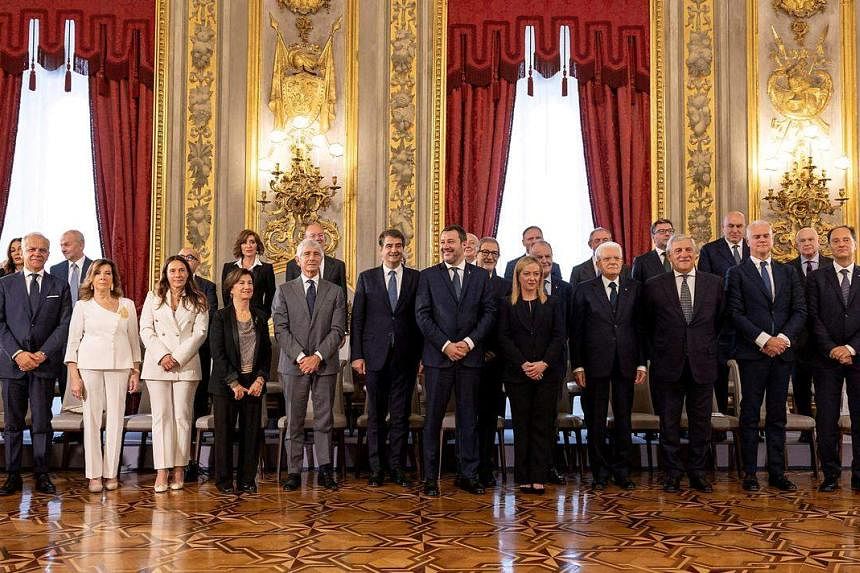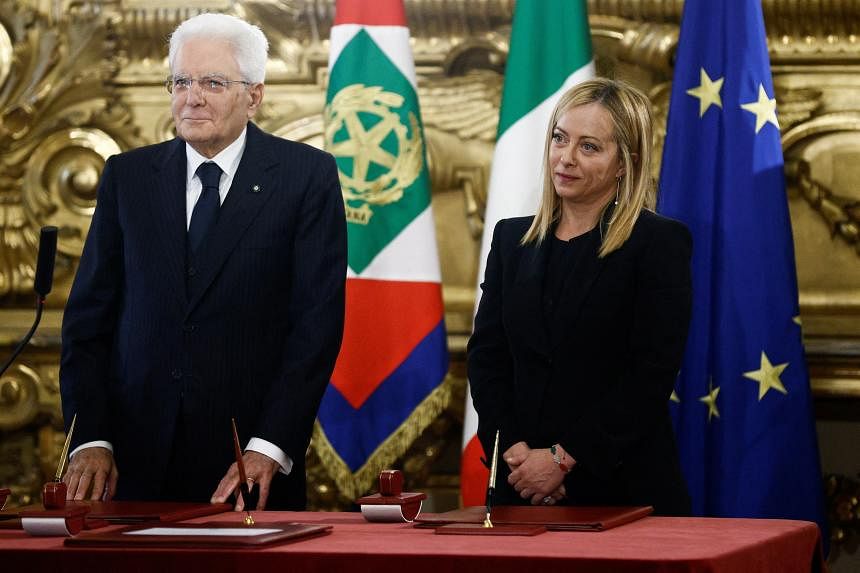ROME - Far-right leader Giorgia Meloni was sworn in as Italian prime minister on Saturday, to become the first woman to head a government in Italy.
Ms Meloni took the oath before President Sergio Mattarella at the Quirinal Palace in Rome, once home to popes and kings of Italy.
Her post-fascist Brothers of Italy party – Eurosceptic and anti-immigration – won the Sept 25 legislative polls but needed outside support to form a government.
Ms Meloni’s appointment is an historic event for the euro zone’s third largest economy and for Brothers of Italy, which has never been in government.
It won 26 per cent of the vote last month, compared to eight and nine per cent respectively for her allies Forza Italia and the far-right League.
Ms Meloni’s 24-strong Cabinet, including six women, suggests a desire to reassure Italy’s partners. She appointed Giancarlo Giorgetti as economy minister, who served under the previous government of Mr Mario Draghi.
Mr Giorgetti, a former minister of economic development, is considered one of the more moderate, pro-Europe members of Mr Matteo Salvini’s League.
Ms Meloni also named ex-European Parliament president Antonio Tajani, of Forza Italia, as foreign minister and deputy prime minister.
Mr Salvini will serve as deputy prime minister and minister of infrastructure and transport.
That appointment is likely to disappoint Mr Salvini, who wanted Ms Meloni to give him the role of interior minister again after he previously held the post between 2018 and 2019.
That post went instead to a technocrat, Rome prefect Matteo Piantedosi.
A formal ceremony for the handover of power from Mr Draghi to Ms Meloni will take place on Sunday before the premier leads the first Cabinet meeting.
‘Constructive cooperation’
European Commission chief Ursula von der Leyen congratulated Ms Meloni.
“I count on and look forward to constructive cooperation with the new government on the challenges we face together,” she tweeted on Saturday. European Parliament speaker Roberta Metsola tweeted in Italian that “Europe needs Italy”.
Ms Von der Leyen and Ms Meloni later held telephone talks, which the Commission chief described as “good”, adding: “We will work together to address the critical challenges of our time, from Ukraine to energy.”

US President Joe Biden congratulated Ms Meloni and called Italy a “vital Nato ally and close partner”.
Ukrainian President Volodymyr Zelensky tweeted he looked “forward to continued fruitful cooperation to ensure peace and prosperity in Ukraine, Italy and the world”.
Ms Meloni tweeted in response: “Italy is and will always be on the side of the brave people of Ukraine that is fighting for its freedom and for a rightful peace. You are not alone!”
Nato Secretary-General Jens Stoltenberg said he looked forward to working with her.
Germany’s Chancellor Olaf Scholz also congratulated her on Twitter in English, adding: “I look forward to continue working closely together with Italy in EU, Nato and G7.”
Hungarian Prime Minister Viktor Orban said it was a “big day for the European Right”.
Unity concerns
Talks to form a government had been overshadowed by disagreements with her two would-be coalition partners. While Ms Meloni has backed Ukraine since the Russian invasion, the leaders of Forza Italia and the League are both considered close to Moscow.
Italian news media have reported extensively a leaked recording in which Forza Italia leader and former prime minister Silvio Berlusconi talks about his warm ties with Moscow, and appears to blame the war on Mr Zelensky.
Mr Berlusconi says the comments were taken out of context.
Mr Salvini is a long-time fan of Russian President Vladimir Putin and has criticised Western sanctions on Russia.
Despite her Eurosceptic stance, Ms Meloni has been firm about her support for Ukraine, in line with the rest of the European Union and the United States.
But the tensions add to concerns that Ms Meloni’s coalition, held together by the need for a parliamentary majority, will struggle to maintain unity.
Challenges ahead
Ms Meloni’s coalition wants to renegotiate Italy’s portion of the EU’s post-Covid-19 recovery fund.
It argues the almost €200 billion (S$280 billion) it expects to receive should take into account the current energy crisis, exacerbated by Moscow’s invasion of Ukraine, which has hit supplies of Russian gas to Europe.
But the funds are tied to a series of reforms only just begun by Draghi’s government, and analysts say Ms Meloni has limited room for manoeuvre.
Ms Meloni had campaigned on a platform of “God, country and family”, sparking fears of a regression on rights in the Catholic-majority country. AFP

